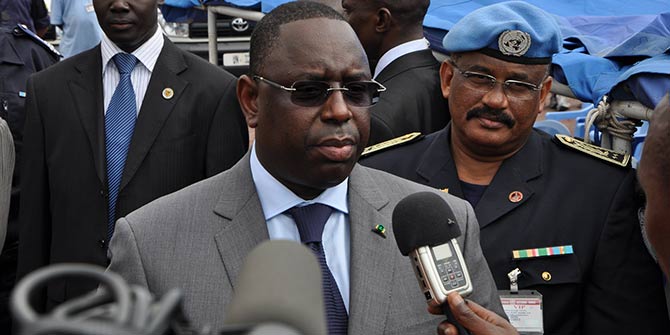Ndongo Samba Sylla says that this masterfully written synthesis reveals the pitfalls that the DGT has set for African countries.
At the beginning was the “colonial pact”. The colonies were integrated in monetary and commercial terms with the metropolis, which controlled their financial flows and foreign trade. They were forbidden to industrialise. Th eir role was to provide raw materials at preferential conditions to the metropolis and to serve as outlets for its productions. The United States of America was founded following a war of independence to put an end to the English “colonial pact”. Imitating the British industrial strategy, they managed, through unprecedented protectionism, to industrialise and develop. France, Germany, and Japan used the same protectionist strategies and became rich industrial nations. The former European colonies, which had become ACP (African, Caribbean, and Pacific) countries, which could not afford to escape the “forced liberalism” of their metropolis, remained poor and non-industrialised.
eir role was to provide raw materials at preferential conditions to the metropolis and to serve as outlets for its productions. The United States of America was founded following a war of independence to put an end to the English “colonial pact”. Imitating the British industrial strategy, they managed, through unprecedented protectionism, to industrialise and develop. France, Germany, and Japan used the same protectionist strategies and became rich industrial nations. The former European colonies, which had become ACP (African, Caribbean, and Pacific) countries, which could not afford to escape the “forced liberalism” of their metropolis, remained poor and non-industrialised.
After African independences, the European project was to reorganise the former colonial empires on a more competitive basis between the different European countries. Instead of the British, French, Portuguese, etc. juxtaposed private domains, there would be just a pan-European private domain composed of countries formerly under the yoke of European power. This desire to establish a concerted “colonial pact” at European level gave rise to the Yaoundé and Lomé Conventions, under which European countries granted the ACP countries so-called “non-reciprocal trade preferences”: the possibility of exporting without customs duties and without quotas or at least on preferential terms. However, the logic of the pan-European private domain has been challenged by the third countries it has harmed, namely before the World Trade Organisation (WTO).
Since the Cotonou Agreement (2000-2020), which succeeded the Lomé Conventions, the European Union (EU), anxious to conquer new markets, has been represented in the negotiations by the European Commission’s DG Trade (DGT) and no longer by DG Development and Cooperation. It requires that trade agreements with ACP countries be based on “reciprocity”: Economic Partnership Agreements (EPAs). Henceforth, the latter must liberalise their foreign trade – reduce or even eliminate tariffs on their imports, no longer introduce new export taxes and reduce the level of existing export taxes, etc. – in order to benefit from the EU’s “trade preferences”. Beyond that, these EPAs provide for the extension of the Most Favoured Nation (MFN) clause to EU countries as well as negotiations to liberalise areas that developing countries have refused to negotiate at the WTO (services, intellectual property, public procurement, competition, investment, etc.).

For the African continent, the consequences of the implementation of such asymmetric agreements would probably be an uncompensated drop in States’ tax revenues, a trade diversion to the EU, the destruction of agricultural sectors and the annihilation of any industrialisation prospects. The result would be a trend towards chronic balance of payments imbalances and thus to install African countries in a vicious external debt dynamic.
Yet, the EU, recently emulated by the African Union (AU) with its rash plan for a Continental Free Trade Area (AfCFTA), is actively propagating the erroneous idea that trade liberalisation contributes to the economic development of the African continent. Since the early 2000s, the DGT has consistently sought to have ACP countries sign and ratify EPAs. While the mobilisation of social movements has delayed the EU project in Africa, the danger of “economic hanging agreements” or even “economic impoverishment agreements”, to use the language of EPA detractors, is still present. This is what Jacques Berthelot explains in a recent book entitled “You said Free Trade? The Economic ‘Partnership’ Agreement between the European Union and West Africa’ (L’Harmattan 2018, title translated from French). Through this masterfully written synthesis, the French agro-economist reveals the pitfalls that the DGT has set for African countries. While tracking omissions, errors, and misrepresentations in the analyses (on behalf of this entity), it carefully examines the costs and economic and social consequences of implementing EPAs and concludes with useful recommendations.
The EPA or the law of the strongest
To start the EPA negotiations, the DGT argued that the discriminatory nature of the “non-reciprocal trade preferences” granted to ACP countries was incompatible with WTO rules. This argument, as Jacques Berthelot shows, is a biased interpretation of WTO rules that prohibit discrimination when it is based on geographical logic but allow it when it is granted according to the level of development. In West Africa, including Mauritania, 12 out of 16 countries belong to the LDCs (least developed countries). Under the Everything But Arms (EBA) Decision, the latter are supposed to be able to export to the EU everything but arms without customs duties or quotas. As Cape Verde has a special status, only Nigeria, Côte d’Ivoire, and Ghana should in principle be covered by the EPAs. However, by forcing all West African countries to sign and ratify a regional EPA that would involve the liberalisation of nearly 80% of tariff lines, the EU, Jacques Berthelot emphasises, makes selective use of EBA and goes against WTO rules.
In order to compensate for the foreseeable loss of customs revenue incurred by West African countries, the EU has promised to disburse €6.5 billion every five years until 2035. In reality, there are no additional funds specific to EPAs but a restructuration of existing funds, including those granted under the European Development Fund (EDF). However, explains Jacques Berthelot, “the Cotonou Agreement expires in 2020 and […] it is not known if it will be renewed and with what budget, and in any case not until 2035 since the EU budget is only programmed until 2020. Not to mention that the United Kingdom (UK), which is leaving the EU, contributes 14.5% to the 11th EDF, which is not an EU budget but is financed by the Member States. »
To promote its free trade agenda, the DGC has ignored the different views of some EU Member States. It also repudiated three impact studies it had commissioned itself because their results were an obstacle to its propaganda. It underestimated the costs of the West African EPA, particularly in terms of lost tax revenues. Just as it has deliberately exaggerated its benefits for African countries. While the “trade preferences” to the benefit of the latter are increasingly being eroded as a result of the many free trade agreements signed by the EU with third countries, nothing would prevent the EU from exporting its subsidised agricultural products to West Africa in the future.
The EPA: a Trojan Horse for African Integration
Another important lesson from Jacques Berthelot’s book is the risk of commercial disintegration of ECOWAS, which has a common external tariff in place since 2015. The latter can only be viable if all the countries in this bloc have the same position vis-à-vis the EPA and also the AfCFTA. While Nigeria refuses to sign the EPA which is not of interest to it, Côte d’Ivoire and Ghana had signed interim EPAs since the end of 2007 with tariff dismantling expected from September 2018 and December 2021 respectively. These commitments to the EU are incompatible with those to ECOWAS. If the situation does not change, the other ECOWAS countries will have to set up customs barriers against them.
In this context, the signing of the AfCFTA agreement by thirteen West African countries, including Côte d’Ivoire and Ghana, far from promoting African trade integration, is likely to make it implode. The AfCFTA agreement provides for a 90% liberalisation of tariff lines. However, as the interim EPAs of Côte d’Ivoire and Ghana provide for the activation of the “most favoured nation” clause, this implies in principle that the EU should also benefit, in turn, from the same tariff advantages.
Ghana and Côte d’Ivoire, under pressure from subsidiaries of European groups, have so far decided to go it alone. Yet, given the importance of the ECOWAS market for their intra-African exports, they would be the main losers in the event of West African trade disintegration. Needless to say, with a 90% liberalisation of imports from the EU, tax revenue losses will in their case be greater than expected.
The EU is irresponsible and short-sighted
By persisting in its free trade fundamentalism, the EU is showing, according to Jacques Berthelot, irresponsibility and short-sightedness. Faced with the significant population growth of Africa, a continent that is also facing the challenges of climate change and food sovereignty, EPAs are undoubtedly a recipe for disaster. On the one hand, by depriving States of tax revenues and exposing fragile agricultural and industrial sectors to competition from subsidised European products, they can only aggravate social poverty in West Africa. According to Jacques Berthelot, an increase in “illegal” migrants and violent armed movements is to be expected. In this context, the main function of EU development aid will be to clean up in vain the damage that its own policies have helped to create. On the other hand, if the EU were farsighted, it would have realised that it has no long-term interest in the impoverishment of the African continent. The population of West Africa will exceed the EU’s aging population in 2030. This demographic dynamism, if accompanied by policies to raise the income level of workers, suggests future markets for the EU’s exports of high value-added goods and services. Unfortunately, EPAs are the most obvious symbol of the contradictory stance of the EU which in practice continues to deploy neo-colonial policies of the impoverishment of the African continent while rhetorically professing its commitment to work for its prosperity.
What should be done?
Once the diagnosis has been made, what should be done? Jacques Berthelot recommends four savvy measures that require political boldness, including breaking with the neoliberal ideology that informs integration initiatives in Africa. First, “the signatures of these EPAs, extorted by the fraudulent manoeuvres of the European Commission, should be rendered null and void”. Secondly, African countries must postpone the AfCFTA project, a premature and suicidal initiative as it stands, in order to focus initially on integration within the framework of the Regional Economic Communities (RECs). Third, RECs must work to become members of the WTO in order to have a voice and better defend their interests. Finally, farmers should be guaranteed remunerative and stable prices instead of having them delivered foot and fist tied to the whims of international markets.
At a time when the ratification of the AfCFTA agreement and the negotiations on the post-Cotonou period are underway, Jacques Berthelot’s book comes in handy. It is viatic for all those who are concerned about trade integration for the economic development of Africa.
Did You Say Free Trade ?: The Economic ‘Partnership’ Agreement European Union – West Africa by Jacques Berthelot. Published by Editions L’Harmattan. 2018.
_____________________________________________________________________________________
Ndongo Samba Sylla (@nssylla) is Research and Programme Manager for the Rosa Luxemburg Foundation. He is the editor and author of a number of books including The Fair Trade Scandal.
The views expressed in this post are those of the author and in no way reflect those of the Africa at LSE blog, the Firoz Lalji Centre for Africa or the London School of Economics and Political Science.






1 Comments